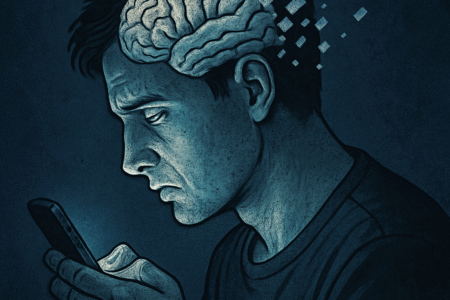This is Foramz, and we are discussing the issue of the digital age: Digital Dementia today. Has it ever happened to you that you are trying to remember your best friend’s phone number, but you can’t? You can not even recall your number without checking your phone. Earlier in life, you used to remember birthdays, shopping lists, and directions- now it all lives inside your device. Is this something that you relate to? Welcome to the age of digital dementia. Digital Dementia is a term used to describe how our heavy dependence on digital devices is making our memory, cognitive, and brain power weaker, especially when it comes to things we used to remember ourselves. Let us understand the condition of Digital Dementia. Digital Dementia is not a medical condition like Alzheimer’s or traditional dementia. It is a phrase created by neuroscientists to explain how excessive screen use and technology reliance can make our brains lazy. It is noticeable in young people, who are spending more and more time on phones with increasing screen time day by day. In today’s technology-driven world, we are surrounded by digital devices right from the time we wake up till we go back to sleep at night. This scenario is detrimental and affects our memory and cognitive function. Due to long periods of screen time, there is an effect on the brain’s cognitive functions. This happens due to the decreased attention span and prolonged screen time, which often involves sitting in a difficult posture on the bed or couch. The posture includes a lying position slumped neck, and back. This can cause various This can cause various health-related problems, such as obesity, body aches, spine problems, and backaches. We are not using all of our neuronal channels in the brain as much, which can lead to excessive anxiety, stress levels, and possible changes in behavioral patterns. Why is Digital Dementia so common? There are a few key reasons why digital dementia is becoming more common, including too much screen time. Constant use of smartphones, tablets, and computers means less time spent on things that naturally challenge the brain. Naturally challenging brain includes engaging in reading, puzzles, and real conversations. Another major reason is that the lack of physical activity, movement, and exercise stimulates brain health. Sitting with screens all day reduces this. Reducing face-to-face conversations is also a reason for digital dementia. In the age of online meetings, FaceTime, and calls, it has become convenient to talk to loved ones. Even if we have an option to meet someone in real life, we choose to talk on or phone rather than moving out of the house.: Real conversations help build emotional intelligence and memory. Texting doesn’t give your brain the same amount of workout. How to know if you have digital dementia? People who are experiencing digital dementia may notice forgetting simple things, like names, dates, or where they left something, difficulty focusing on one task, feeling mentally tired or foggy, having shorter attention spans, and lastly, having a poor sleep quality due to screen use before bed. Technology is amazing – it makes life easier, faster, and more connected. But when we rely on it for everything, especially things our brains are designed to do, we risk losing some of our natural abilities. Digital dementia is a wake-up call to balance our digital and real lives and give our brains the workout they deserve. Your phone is smart, but your brain is smarter. Don’t let it forget how powerful it is. Even students and young professionals who use screens for hours each day are showing signs typically seen in older adults, which is alarming. If you are someone with digital dementia, worry not, because in the next episodes, we will be talking about how to overcome digital dementia and slowly return to the state of peace, nature, and love. Keep Reading Foramz for you daily dose of Moral Support.
CONNECTING THOUGHTS

